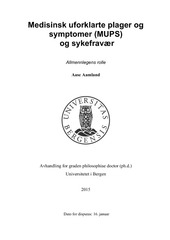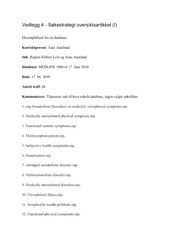| dc.contributor.author | Aamland, Aase | en_US |
| dc.date.accessioned | 2015-01-23T14:46:46Z | |
| dc.date.available | 2015-01-23T14:46:46Z | |
| dc.date.issued | 2015-01-16 | eng |
| dc.identifier.isbn | 978-82-308-2740-6 | en_US |
| dc.identifier.uri | https://hdl.handle.net/1956/9249 | |
| dc.description.abstract | Medically Unexplained Physical Symptoms (MUPS) is a term which captures conditions characterized by subjective symptoms without corresponding objective findings. Fibromyalgia, chronic fatigue syndrome and irritable bowel syndrome are examples of long-lasting and disabling MUPS-disorders. It is claimed that sick leave both in Norway and other countries, is mainly caused by unspecific health complaints and MUPS-disorders. General practitioners (GPs) have a key role for patients with MUPS and sick leave work. The objective of this thesis is to develop new knowledge on MUPS and sick leave, with a special focus on the GP´s role. We have conducted three sub-studies based on the following aims: 1) What does the existing literature say about phenomena associated with sick leave among patients with MUPS? 2) What is the consultation prevalence, symptom pattern, employment status and the GPs’ management strategies for patients with persistent MUPS in Norwegain general practice? and 3) What kind of experiences related to marginalization do patients with MUPS present after being long-term sick leave? In the first sub-study we conducted a systematic review of empirical research on MUPS and sick leave. A total of 16 studies with heterogeneous study-designs were included for a pragmatic thematic analysis. We searched for overarching themes from text and numbers in the included studies. In the second sub-study we aimed to describe patients with persistent MUPS in Norwegian general practice. We invited a representative sample of GPs to register patients, who fulfilled our case-definition of MUPS, during four weeks of regular clinical practice. We described consultation prevalence, symptom pattern, employment status and the GPs’ management strategy. In the third sub-study we conducted two focus group interviews with patients on long-term sick leave due to MUPS. We were particularly interested in experiences that may counteract further exclusion from the labour market. Data were analyzed using systematic text condensation. Results from the systematic review were split into two categories: patient-related and GP-related factors. For the patients, psychiatric comorbidity (anxiety and depression), and total symptom burden were associated with higher levels of sick leave. Lack of objective findings made the sick leave assessment more difficult for the GPs. None of the interventions aiming to improve GPs knowledge and management of patients with MUPS, resulted in lower levels of sick leave. In the cross-sectional study we found 3 % consultation prevalence of persistent MUPS and the majority of these were women. As much as 45 % of the patients were currently working, significantly more men. The GPs reported that supportive counselling was the most common management strategy. The participants in the focus group study described predominantly negative experiences from being sick-listed. The fact that complaints and symptoms were invisible was described as an extra-burden beoynd the sick leave itself. Negative experiences of marginalization could be counteracted through different personal coping strategies, positive attention and trust from family and friends, and confidence and understanding from professionals. The analysis showed that support from the GP can be important and may even further counteract marginalization through their follow-up of long-term sick listed patients with MUPS. The thesis presents the following main findings: Patients with persistent MUPS constitute one of the most common patient groups in Norwegian general practice. The GPs may hold an important supportive role for patients with MUPS on long-term sick leave. This may in turn counteract further marginalization. Yet, no interventions in general practice have shown to reduce sick leave. There are both similarities and diversities among patients with MUPS regarding demographics, psychiatric comorbidity and employment status. The GPs’ most common management strategy for patients with MUPS is supportive counselling. | en_US |
| dc.language.iso | nob | eng |
| dc.publisher | The University of Bergen | eng |
| dc.relation.haspart | Paper I: Aamland A, Malterud K, Werner EL. Phenomena associated with sick leave among primary care patients with Medically Unexplained Physical Symptoms: A systematic review Scand J Prim Health Care, 2012; 30: 147–155. The article is not available in BORA due to publisher restrictions. The published version is available at: <a href="http://dx.doi.org/10.3109/02813432.2012.704812" target="blank"> http://dx.doi.org/10.3109/02813432.2012.704812</a> | en_US |
| dc.relation.haspart | Paper II: Aamland A, Malterud K, Werner EL. Patients with persistent Medically Unexplained Physical Symptoms: A descriptive study from Norwegian general practice BMC Fam Pract, 2014;15:107. The article is available at: <a href="http://hdl.handle.net/1956/8005" target="blank">http://hdl.handle.net/1956/8005</a> | en_US |
| dc.relation.haspart | Paper III: Aamland A, Werner EL, Malterud K. Sickness absence, marginality, and medically unexplained physical symptoms: A focus-group study of patients ’ experiences Scand J Prim Health Care, 2013; 31: 95–100. The article is not available in BORA due to publisher restrictions. The published version is available at: <a href="http://dx.doi.org/10.3109/02813432.2013.788274" target="blank">http://dx.doi.org/10.3109/02813432.2013.788274</a> | en_US |
| dc.title | Medisinsk uforklarte plager og symptomer (MUPS) og sykefravær. Allmennlegens rolle | en_US |
| dc.type | Doctoral thesis | |
| dc.rights.holder | Copyright the author. All rights reserved | |

